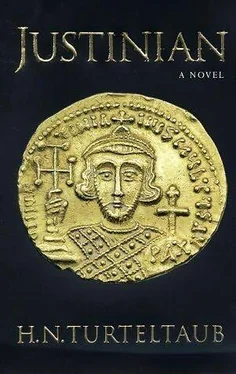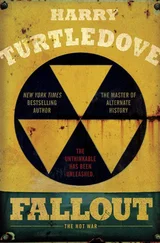Harry Turtledove - Justinian
Здесь есть возможность читать онлайн «Harry Turtledove - Justinian» весь текст электронной книги совершенно бесплатно (целиком полную версию без сокращений). В некоторых случаях можно слушать аудио, скачать через торрент в формате fb2 и присутствует краткое содержание. Жанр: Историческая проза, на английском языке. Описание произведения, (предисловие) а так же отзывы посетителей доступны на портале библиотеки ЛибКат.
- Название:Justinian
- Автор:
- Жанр:
- Год:неизвестен
- ISBN:нет данных
- Рейтинг книги:3 / 5. Голосов: 1
-
Избранное:Добавить в избранное
- Отзывы:
-
Ваша оценка:
- 60
- 1
- 2
- 3
- 4
- 5
Justinian: краткое содержание, описание и аннотация
Предлагаем к чтению аннотацию, описание, краткое содержание или предисловие (зависит от того, что написал сам автор книги «Justinian»). Если вы не нашли необходимую информацию о книге — напишите в комментариях, мы постараемся отыскать её.
Justinian — читать онлайн бесплатно полную книгу (весь текст) целиком
Ниже представлен текст книги, разбитый по страницам. Система сохранения места последней прочитанной страницы, позволяет с удобством читать онлайн бесплатно книгу «Justinian», без необходимости каждый раз заново искать на чём Вы остановились. Поставьте закладку, и сможете в любой момент перейти на страницу, на которой закончили чтение.
Интервал:
Закладка:
I had been out to the Long Wall before, but no farther. Philaretos, the count of the Long Wall, greeted me at Selymbria, the town anchoring the wall to the Sea of Marmara. I had not seen him since Eudokia's funeral. "God grant that my granddaughter thrive," he said, "for she is all I have left by which to remember the girl."
"God grant it," I echoed, and said no more. He made the sign of the cross, thinking me pious. But what I meant was more on the order of, God had better grant it, for I intend to have nothing to do with it.
The Long Wall is different from that of the imperial city. Rather than alternating courses of brick and stone, it is built of hard, pinkish cement with chunks of brick embedded in the cement. It also, I must sadly say, differs from Constantinople's wall in its effectiveness, or lack thereof. Where, along with the protection of God, Constantinople's wall has kept the city inviolate since it was built, barbarians have repeatedly penetrated the Long Wall and plundered the suburbs it was meant to protect. Stretching more than thirty miles from the Sea of Marmara to the Black Sea, the Long Wall was too long to garrison adequately.
Still, though, it did offer the regions nearest the imperial city some protection. Passing beyond it, I felt I was leaving safety and entering land that, while nominally under the rule of the Roman Empire, was in fact detached from Romania. I aimed to make Roman rule real there once again, and nominal no more.
Had I wanted to push the army straight down the Via Egnatia, the military highway of the Romans for the past eight hundred years and more, I could have been in Thessalonike very soon. But I had planned a campaign, not a military parade, and so in search of Sklavenoi the army plunged off the highway and into the forested, sometimes marshy valleys that lay to the north.
I prayed at the church of St. Glykeria in Herakleia (or, as the antiquarians call it, Perinthos), and had my prayer answered the very next day, the army flushing out several little Sklavinian farming villages north of the town. The barbarians seemed utterly astonished at the presence of Roman soldiers in land they obviously believed to be theirs.
None of them spoke Greek. I had their headmen haled before me and asked them, "Would you sooner die or obey me?" I thought at first that my interpreter had suffered a coughing fit, but he was merely translating the question into their hideous, guttural dialect. Their answers were as full of choking, wheezing noises.
"They say they will obey, Emperor," the interpreter said.
"Good. I thought that would be a choice even a Sklavinian could understand," I said. "Since they say they will obey, tell them I am going to resettle their whole clan or tribe or whatever they call themselves in Anatolia. Tell them they can farm there and pay taxes to the fisc and furnish us with soldiers when we need them."
"Emperor, I can tell them they will farm," the interpreter said. "I can tell them they will give us soldiers. But I cannot tell them they will pay us taxes. Their language has no words for such things."
"What? They don't know about taxes?" I threw back my head and laughed. "Very well. Tell the poor barbarians what you can. They'll learn about the other soon enough. The officials of the fisc will give them detailed lessons, I have no doubt."
A small escort of Romans led the Sklavenoi down the Via Egnatia and then east toward Constantinople, whence they would cross into the empty lands of Anatolia. I allowed them no more than they could carry in their hands. Considering how little they had, I did not greatly deprive them.
The season being summer, the millet and barley in their fields were too far from ripe to feed my army. They did, however, have a good store of grain hidden in underground pits, as those familiar with their habits had foretold. We added that to our own supply, and our horses had good grazing in the fields.
It soon became clear that, although we had captured their villages, we had not sent all of the Sklavenoi off to the imperial city for resettlement. Some of them must have escaped into the woods and run off to warn their fellow tribesmen, for the next Sklavinian settlements we came upon were deserted, not only the people but also the livestock being gone.
I required no training in logic to realize the Sklavenoi from the abandoned villages were in turn surely letting more barbarians know we were on the march. A young officer familiar with the Sklavenoi, Bardanes the son of the patrician Nikephoros, confirmed my impression- not, I say, that it needed much confirmation. "Emperor, the next ones we meet will resist us," he said.
"No doubt you're right, Philippikos," I replied, and he beamed at me: he preferred that thoroughly Greek name to the Armenian one his father had given him as a sign of his ancestry. I went on, "I trust the army will be ready to meet their onslaught man to man, shield to shield."
"In an open fight, we'd smash them to bits," he said. "They aren't likely to give us an open fight, though. They'd rather spring ambushes, and"- he looked around-"this country is made for that sort of thing."
He was right, the land being rough and broken and woody, the roads leading north off the Via Egnatia no better than cattle tracks and, now that we had moved a couple of days' journey inland, sometimes disappearing altogether. He was also right about the Sklavenoi. As our horsemen, having no other choice, went up a game path in single file, javelins flew out of the woods and wounded one of them and two horses. After that, I dismounted some of the soldiers and sent them through the undergrowth to either side of the road. The Sklavenoi shot arrows, some poisoned, at them, but they caught and killed a good number of barbarians, too. Our advance through the Sklavinias continued.
Not all the Sklavinian chiefs and petty kings fled on hearing of our approach. Some yielded themselves and all their people up to us. I resettled them just as I had the Sklavenoi we had captured and overcome in war, although I allowed them to take along their livestock and carts and wagons filled with their belongings, the better to start their new lives in Anatolia.
You could never tell what would happen in any particular little Sklavinia. All depended on the will of the chieftain who ruled that patch of ground. Rather more of them, I think, chose to fight than to surrender. Their poisoned arrows were weapons not to be despised. Several of our men died from them, while others were mutilated: the sole cure the physicians knew was to cut away the flesh around the arrowhead to keep the venom from spreading throughout the victim's system. The physicians gave these poor fellows great draughts of wine infused with poppy juice before plying their scalpels, but screams still echoed through the gloomy forests of Thrace.
A certain Neboulos was kinglet of the largest and strongest Sklavinia not under the control of the Bulgars; it lay north and east of Thessalonike. This Sklavinian had the arrogance to send envoys to me warning me not to enter the territory he reckoned his. "You do that, he kill all your men, all your horses," one of these men said in bad Greek.
"He will have his chance," I said.
"He kill you, Emperor, in particular especial," the envoy warned redundantly.
"He will have his chance," I repeated, and sent the Sklavenoi away with the message that Neboulos could either yield or face the weight of Roman wrath.
That evening, our army camped by a stream with a marsh and reeds on the far bank. More reeds grew on the western bank, where we were encamped. I took my horse down to the edge of the stream to water it and to get a drink for myself, having been in the saddle all day. Nikephoros's son Bardanes (or, again to use his own coining, Philippikos) went down to the stream alongside me, intent on the same errands. Stooping to fill a cup of water for himself, he suddenly froze in place. Then he pointed to one of the reeds that seemed to me no different from any of the others. "Do you see that, Emperor?" he asked quietly.
Читать дальшеИнтервал:
Закладка:
Похожие книги на «Justinian»
Представляем Вашему вниманию похожие книги на «Justinian» списком для выбора. Мы отобрали схожую по названию и смыслу литературу в надежде предоставить читателям больше вариантов отыскать новые, интересные, ещё непрочитанные произведения.
Обсуждение, отзывы о книге «Justinian» и просто собственные мнения читателей. Оставьте ваши комментарии, напишите, что Вы думаете о произведении, его смысле или главных героях. Укажите что конкретно понравилось, а что нет, и почему Вы так считаете.












